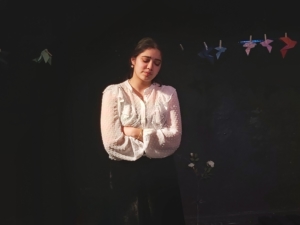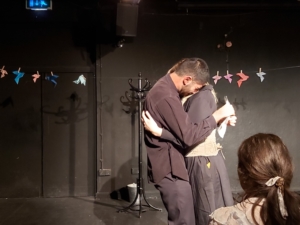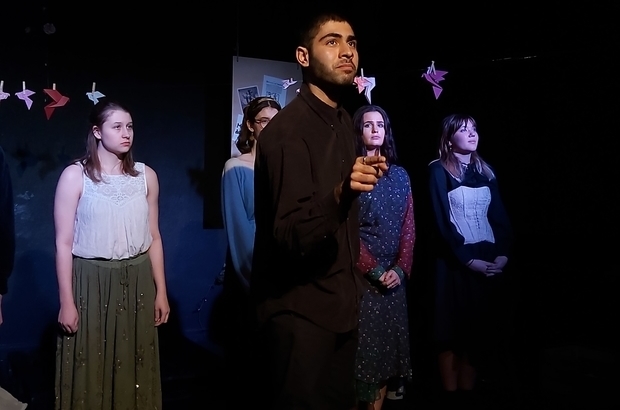ELLIE LACHS reviews Faithful Creatures at Camden People’s Theatre.
Isobel Macleod’s Faithful Creatures, directed by Evie Robinson, is a revelation. It bravely strides away from familiarity as Macleod breathes life back into the story of Gerrard Winstanley’s Diggers, a group of English Protestant radicals in 1649 who occupied St George’s Hill, Surrey and establish an alternative society based on communal living and economic equality. The actors command the stage and the story as their own with re-oiled zealotry. It isn’t, however, solely the period costume that roots us within the realm of a period drama, for that we can look to Winstanley’s consciously verbose and biblically infused speeches.
Macleod’s interests are not focused on the politics and contention, but with the relationships and identities that comprise the movement. She gives the Diggers’ ideology a human face which might otherwise have been difficult to identify with for a modern audience. Through this anthropological approach to the movement, Macleod opens up the Pandora’s box of radicalism and releases the vulnerability, trouble, and desperation that lies at its core. There is a silver lining of hope and belonging, but this glimmers only momentarily amongst the identity crises and complex family relations that facilitate radicalisation. With difficulties at home and a lack of affection, the lure of a radical movement grows…

Image courtesy of Bori Papp.The play’s central characters, sisters and orphans Sigrid and Tove are subject to a hard life. Where Sigrid is afflicted with excruciating cramps and distracting beauty, Tove is afflicted with what she declares to be a lack of womanhood as she ‘does not bleed’ and feels more ugly as a result. The two sisters live alone, fend for themselves and seem to be the only person that either of them has to rely on in this world. This is until the charismatic Winstanley shows up. He stops Tove in her tracks in what appears to be the beginning of a slow-burning yet passionate love story. But their affair is quickly proven to be as idealistic as Winstanley’s political convictions. It is, however, through the audience’s hope and expectations of romance that Macleod taps into the ways that political radicalism and radical leaders can become idolised. Winstanley appears as a prominent thinker but as the plot develops it becomes ever clearer that he is first and foremost a charmer.

He subtly homes in on Tove, making her something of a project, he gives her the freedom to write pamphlets to get up on the podium and feel a power that she previously only ever dreamed of. This process, in which Tove becomes enlisted as a member of the Diggers might feel familiar. From Jonathan Franzen’s acclaimed novel, Purity (2015) to Mike Leigh’s film Peterloo (2018) the same process is repeated: the disenfranchised are lured in by the rush and appeal of being part of a movement and being under the scrutiny of a dominant and charismatic leader who is on the tip of a power trip. But this only proves Macleod’s well-grounded research; the methods of recruitment within radical movements are formulaic because the formula works. However, Macleod has more to offer than just that.
Winstanley’s assertion that ‘people tend to stop liking me when they start liking themselves’ assumes that you can only be a True Leveller if you are levelled with insecurity and self-denigration. However, Tove eventually overcomes this and the bubble (which is Winstanley’s intoxicating appeal) bursts. He turns into a reprobate and charlatan and she sets off to start her own proto-feminist commune; the play here quickly turns a different shade from the general tale of anarchist radicalisation. It quickly becomes evident that it is more interested in strong female friendships and empowerment than in the hierarchical and male-dominated pre-existing power which threatens to poison all who come near it.
The plot is staged with impressive attention to detail, Robinson mirrors Tove’s transition from living for the soul to living for the body. As Tove begins to ‘enjoy life’s sensory experience’ in spite of Winstanley, the play becomes ever more saturated with sensory accents. From the intrusive sounds of nature to the rumbling under our feet of the trains nearby. From glossy and subtle lighting across the protagonist’s illuminated face to the shadows of birds cast against the walls, Robinson manages to ground the play’s ideology in real life. It is this which hammers home the relevance of this drama.
The mingling of manipulation and misery is a time-held classic that Macleod has seamlessly revived and revamped with this vivacious and provocative debut.
Faithful Creatures ran from the 13-15th February at Camden People’s Theatre, more details here.
Featured image courtesy of Bori Papp.





